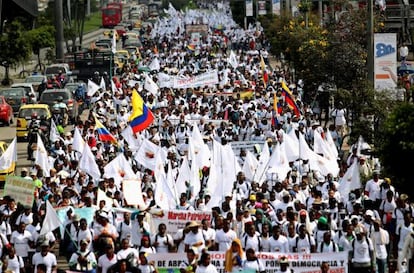Colombians march en masse to support FARC talks
Country’s main cities see hundreds of thousands take to the streets

Hundreds of thousands of people poured onto the streets of Bogota and other Colombian cities on Tuesday in support of the government’s peace negotiations aimed at ending the nearly 50-year-old insurgent war with the Revolutionary Armed Forces of Colombia (FARC) guerrillas.
If the march can be used as a measure of support for a possible peace accord between the administration of President Juan Manuel Santos and the FARC, then Colombians made it clear they want the ongoing brokered talks – which started last year – to be successful.
According to figures given by Colombia’s state emergency agency (FOPAE), more than 900,000 people turned out in Bogota alone.
Santos had been hoping that public opinion was in his favor, and Tuesday’s marches were a clear sign that Colombians want to put an end to Latin America’s oldest insurgent struggle, which has claimed thousands of lives since the FARC was formed in 1964.
Former President Uribe refused to take part in the march
Among the politicians and local celebrities who took part in the march was Attorney General Eduardo Montealegre who said that he was marching for peace and on behalf of the victims of guerrilla violence. His own participation helped encourage more than 1,000 prosecutors and other employees from the attorney general’s office to join him on the streets.
In a clear reference to former President Álvaro Uribe, who has criticized his successor Santos for sitting down with the FARC, Montealegre said that the search for peace should rise above “the meanness and petty political interests” of certain sectors.
Uribe refused to take part in the march but many of the members of his and Santos’ Liberal Party and former administration officials turned out.
“What has occurred here is a genuine mandate from the people so that President Santos can broaden and accelerate the peace process,” said Juan Fernando Cristo, president of the Liberal Party.
Since October, members of the FARC and the Santos government have been meeting intermittently in Havana in talks that are being brokered by Cuba, Venezuela, Chile and Norway.
Besides Uribe, there were still some officials and groups who refused to participate. The leftist Polo Democrático (or Democratic Pole) bloc ignored the marches, as did Solicitor General Alejandro Ordóñez, who was out of the county, but had said beforehand that he didn’t think these types of demonstrations would have any effect on illegal groups such as the FARC.
Tu suscripción se está usando en otro dispositivo
¿Quieres añadir otro usuario a tu suscripción?
Si continúas leyendo en este dispositivo, no se podrá leer en el otro.
FlechaTu suscripción se está usando en otro dispositivo y solo puedes acceder a EL PAÍS desde un dispositivo a la vez.
Si quieres compartir tu cuenta, cambia tu suscripción a la modalidad Premium, así podrás añadir otro usuario. Cada uno accederá con su propia cuenta de email, lo que os permitirá personalizar vuestra experiencia en EL PAÍS.
¿Tienes una suscripción de empresa? Accede aquí para contratar más cuentas.
En el caso de no saber quién está usando tu cuenta, te recomendamos cambiar tu contraseña aquí.
Si decides continuar compartiendo tu cuenta, este mensaje se mostrará en tu dispositivo y en el de la otra persona que está usando tu cuenta de forma indefinida, afectando a tu experiencia de lectura. Puedes consultar aquí los términos y condiciones de la suscripción digital.








































